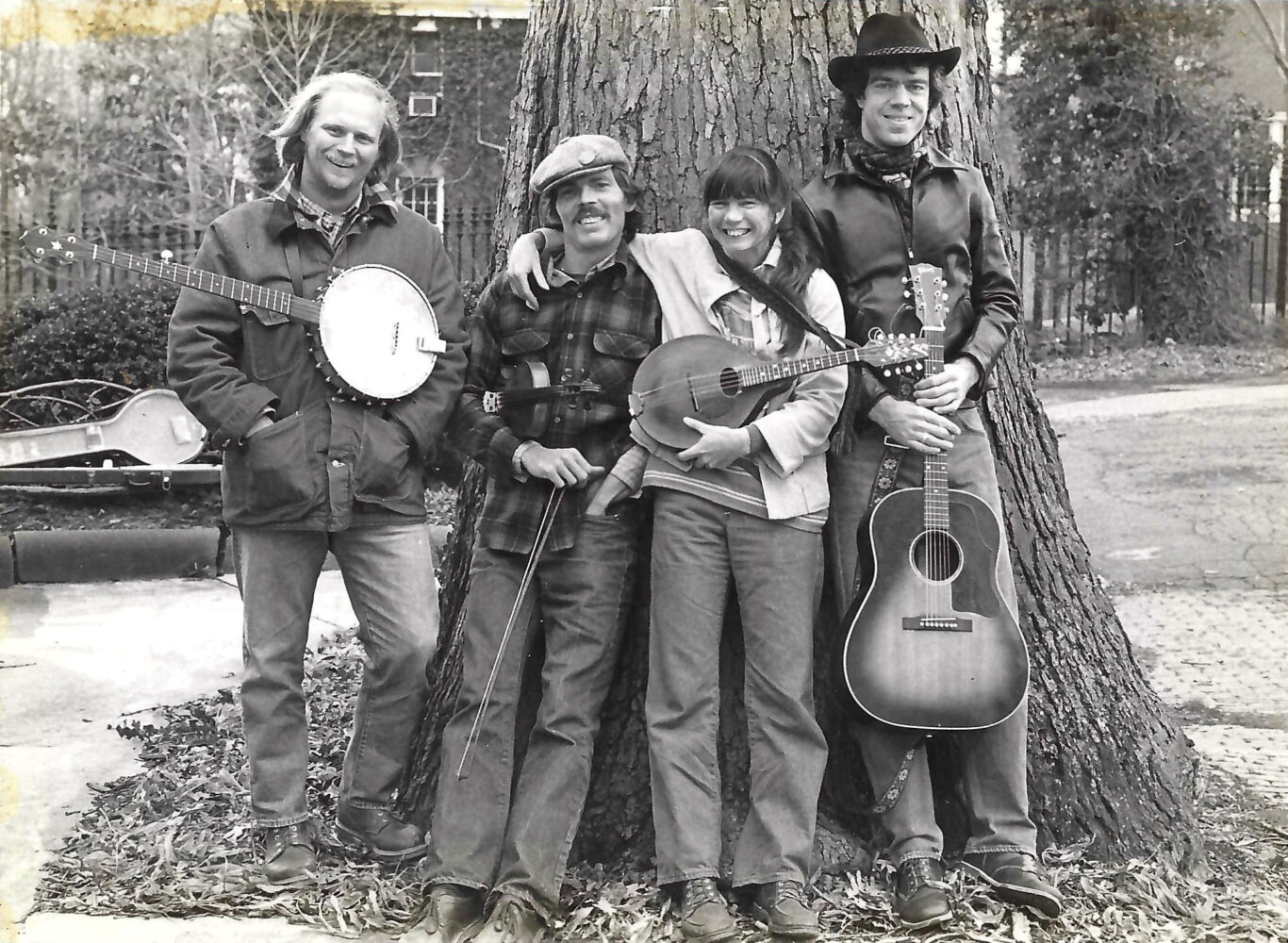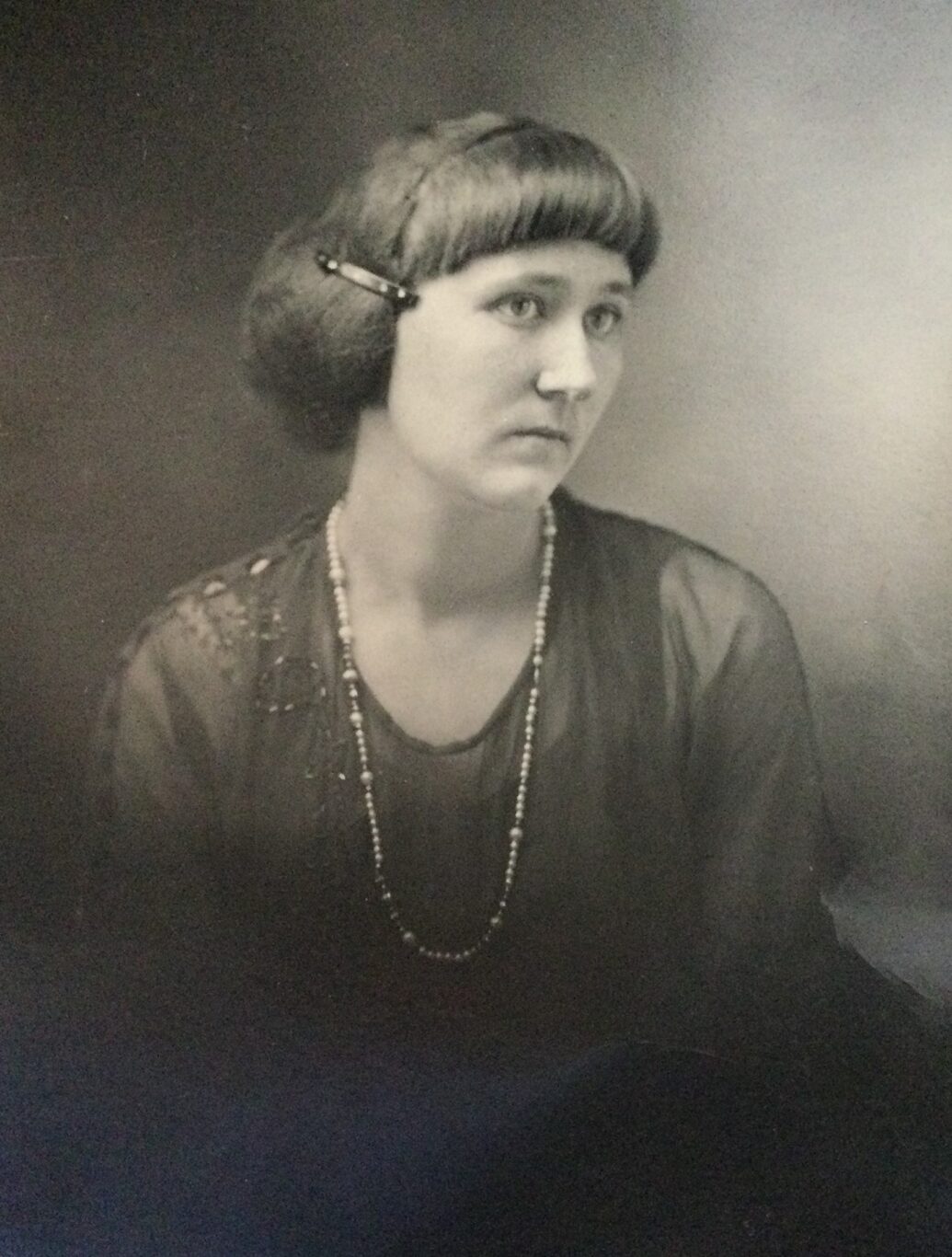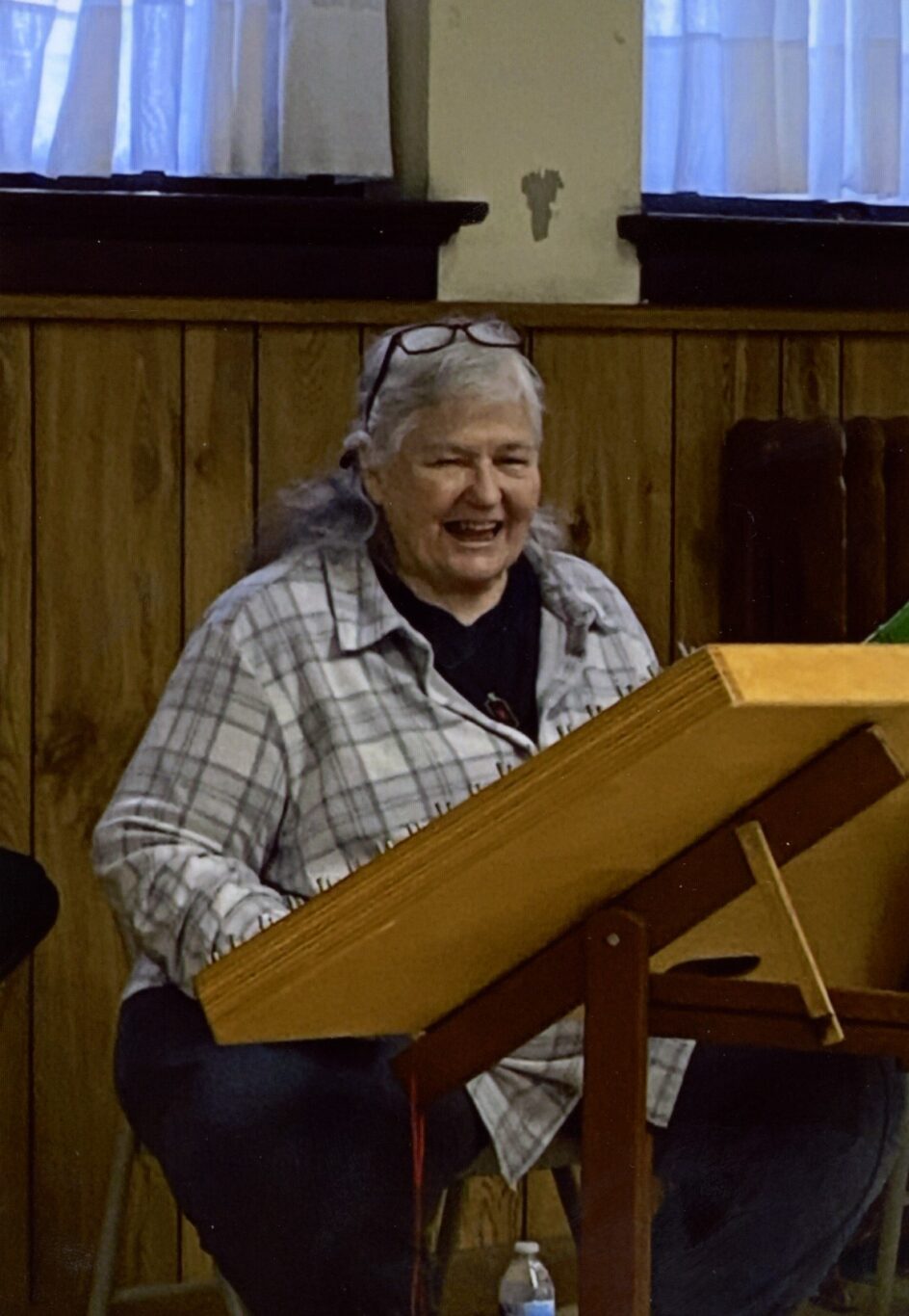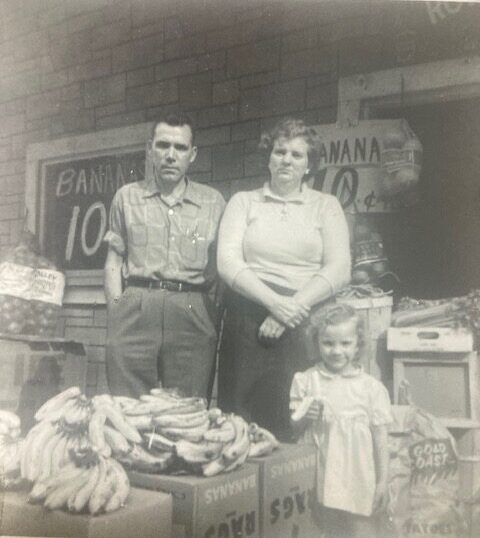Text and Photos By Carl E. Feather
“See these people around here, have you noticed how happy they are?” asks the Rev. Robert Gray as we stand outside Pleasant District Holiness Tabernacle on August 7, 2023.
Indeed, Robert, a soft-spoken yet energetic man in his late 70s, is smiling. So is the Rev. John MacDonald, dressed in a crisp white shirt, black trousers, and black suit coat, despite the August heat and humidity. They appear happy and filled with anticipation; it is the first day of the week-long 81st annual meeting of the Pleasant District Holiness Camp in Preston County.
Fifteen worshipers are settled into their wooden pews when Rev. Gray rings the camp bell seven times, the traditional call to morning worship. All activity outside the tabernacle ceases; not a soul is to be seen wandering the grounds. That’s a rule.

“Everyone on the grounds is expected to attend all services except for possible medical situations,” states one of the campground rules posted about the property and published in the camp brochure. While some churchgoing folks might balk at the camp board’s stringent standards, camp patrons say the rules ensure the camp’s purpose is achieved—keeping people right with God as they pursue holiness and heaven.
To the observant outsider, the most striking manifestation is the attire and lack of adornment among the ladies, who wear skirts or dresses that come below the knee and wear their hair in a bun. Men dress plainly, as well; crisp, button-down shirts, trousers, and well groomed. No one wears shorts, bathing suits, halter tops, or logoed T-shirts at this summer camp.
Robert Gray says the dress code, like everything else done at Pleasant District Holiness, is driven by the Bible. “In like manner also, that women adorn themselves in modest apparel, with shamefacedness and sobriety; not with broided hair, or gold, or pearls, or costly array.” That’s from I Timothy 2:9, King James Version, the only translation permitted in the camp’s pulpit. Further, Robert says scripture must be read from a printed page, not a tablet or cell phone screen. Indeed, worshippers must turn off cell phones or, preferably, leave them in their vehicles, Robert says. These practices, while seeming anachronistic in 2023, naturally emanate from folks who seek to please God, says Robert, a Warrenton, Virginia, resident and part-time pastor.
“When you come to a camp and you get under the conviction of your soul, and when you find the Lord, then he comes and meets you in your heart, old things are passed away and all will become new,” he says, once again referencing the Bible. “And so there is a desire. We don’t have the desire for the things of this world. We have a desire to please God. That’s depicted in God’s Word. So that’s where the change comes from. It’s not that these people are wearing any particular clothing because they feel they have to. It’s because they want to.”
The camp draws campers and evangelists alike from a region that stretches from the Atlantic Coast to Nebraska, where President MacDonald lives. He was elected to the position in 2021 after several years of service as a guest preacher. A full-time, itinerant evangelist, both his grandfather and father have preached at Pleasant District. His father, Charles, serves as pastor of McConkey Church in Taylor County.
Camp meetings have been held at Pleasant District since 1940, except for the two years the Covid-19 guidelines prevented large gatherings. “We’re following the pattern God has established,” John MacDonald says.
Holiness camps are ingrained in Appalachian faith culture like YMCA camps are in suburban childhoods. John MacDonald says the camp meeting experience goes back more than 200 years, when the revival fires of Methodism swept across Kentucky. The 1801 Cane Ridge Camp meeting in Logan County, Kentucky, was the zenith of the Methodist circuit riders’ work in that back country. The revival went on for a year and helped establish the tradition of pitching a tent and immersing thirsty crowds in preaching, singing, and prayer for weeks at a time. Witnesses attributed behaviors “like dead men in a mighty battle,” “the jerks,” and “holy laughter,” to the Spirit’s working at those meetings, which eventually gave rise to Pentecostal Christianity.

Pleasant District focuses on the “graces of the Spirit that are always given” rather than gifts like speaking in tongues, says Evangelist MacDonald. Nevertheless, when the spirit moves, it is difficult to keep silent or seated.
“Oh, glorious time!” says Vernon Pierce, who attended several evening meetings with his son, Larry. “Oh my, it was just like heaven on earth. Just wonderful. … Maybe somebody gets up to testify or maybe it is a song being sung. I’ll tell you what. It’s almost like you got a hot seat. It’s almost like you are sitting on a hot seat when the Lord comes. … I mean the Lord will just hit you like that, and you might jump! Why? It’s God’s spirit plus the spirit of the person or the song that you’re singing, all intertwined in the Spirit of God.” Vernon began attending meetings at Pleasant District in the late 1950s. The Pierces were Free Methodists at the time and currently affiliate with the Allegheny Wesleyan Methodist, which has a denomination camp at Stoneboro, Pennsylvania. But Larry and Vernon say the Pleasant District Association’s camp feels more like home to them. The men make the nearly 100-mile round trip for the evening services rather than stay on the grounds. Vernon, 97, says he’s received many blessings in that tabernacle.
“Oh my, yes! Our second home. We never wanted to miss camp because the Lord would just come in waves,” Vernon says. “He blessed the people, blessed the church. … And, oh, such preaching! Evangelists would take their text from behind the pulpit, and they would come down off that (stage) and just walk back and forth in front of the altar there. Oh, what preaching!”
Other Holiness camps like Pleasant District are only loosely associated, even in an era of social media, which makes it difficult to determine how many exist in West Virginia or the United States. The website campmeeting.us lists only Summersville Nazarene and Black Hills Free Methodist in Grafton in the Mountain State. Listings are voluntary, however, and there are dozens of camps in the Central Appalachian region. Holiness adherents could devote most of their summer weeks to camp meetings.
Holiness is preached at camp meetings, especially during the morning and afternoon sessions, where those who have not experienced the second work are encouraged to seek and receive it. Evenings, the focus shifts to that first work, salvation, getting people to the altar, getting them saved to the strains of “Just As I Am.”
“When I see somebody come to the altar and get saved, that’s the main thing, getting souls saved and keeping them saved. That’s what camp is all about. There’s been a whole lot of people saved in there,” Robert says, motioning to the tabernacle.
This 44-by-82-foot wood frame building is central to the 60-acre, mostly forested site. Twenty-four feet to the peak, the tabernacle was constructed circa 1940 with what was most likely native timber of impressive proportions and lengths. Some of the main beams are 10 inches square. “I’m amazed at the amount of work that went into that,” Robert says.
Built onto a slope that provides amphitheater-like seating with simple, wooden pews, the tabernacle is enclosed with vertical board siding interspersed with hinged, fold-up doors for ventilation. Robert says there was a time the floor was dirt covered with straw to make kneeling for prayer more comfortable. These days, the knees of worshippers protect their knees from a concrete floor with pillows while their hearts connect to God.
Guests who come for the entire week can apply for lodging in either the dormitory or one of the dozen 20-foot-square cabins that flank the tabernacle on two sides. Most are single-unit accommodations, with a porch, front living room, and two bedrooms in the back. There are no restrooms, showers, or kitchens in these cabins; a separate facility below the buildings provides the amenities.

The dormitory is above the kitchen/cafeteria and offers rooms in either a men’s or women’s section. Common restrooms and showers are in the building. Robert stays in room number one of this complex, and like him, many of the frequent campers have permanently adopted one of these rooms as their “own” for the week.
Free will offerings drive the camp’s finances, whether they come from the collections taken during each service or when meals are served. “Support the camp in free will offerings as God’s blessings have been bestowed upon you; God loves a cheerful giver,” is a camp rule. The evangelists and music ministers who provide leadership and ministry to the campers also work by donation, coming to Preston County on faith that their expenses will be covered. There were only four youths at the camp in 2023. Most overnight campers were retired seniors for whom camp week is a practice established in their childhoods and youth. Mayola Keller of Grafton is one of them.
“(Camp) means a lot to me,” she says while waiting for a morning service to start. “I’ve gotten a lot of spiritual help here.” She says her best memories of camp are of the “oneness and fellowship, and the good preaching.”
“I can’t describe it,” she says. “It’s just like a second home, I guess.”

Late pastor served into his 90s
The Rev. Winfield Scotty Mayle served as president of the Pleasant District Holiness Camp Association for thirty-two years, during an era when the tabernacle’s pews often were filled with people seeking and reveling in what John Wesley called the second work of grace—holiness.
The camp board honored the Bruceton Mills resident on August 7, 1999, at the close of his presidency. While in his nineties, Rev. Mayle still made it a point to attend at least one service, usually Sunday morning, at the annual Pleasant District Holiness Tabernacle—his last was 2023.
Rev. Mayle died December 12 that year, at which time he was still serving as pastor of the Woolen Mill Allegheny Conference Wesleyan Methodist Church. The church building and parsonage are located off Woolen Mill Road near Lenox, but neither are in use because the congregation was so small—just Rev. Mayle and three others.
Because of the expenses involved in opening the building, the congregation met in the living room of Rev. Mayle’s son, with whom the pastor made his home. “They just come here for church. It’s a lot easier than taking me down there,” he told me in a summer 2023 visit at his Bruceton Mills home.
The three members insisted upon paying a small monthly stipend to their pastor, and one of the members, Edith Lewis, declared their intention to do so as long as he lived, Rev. Mayle told me.
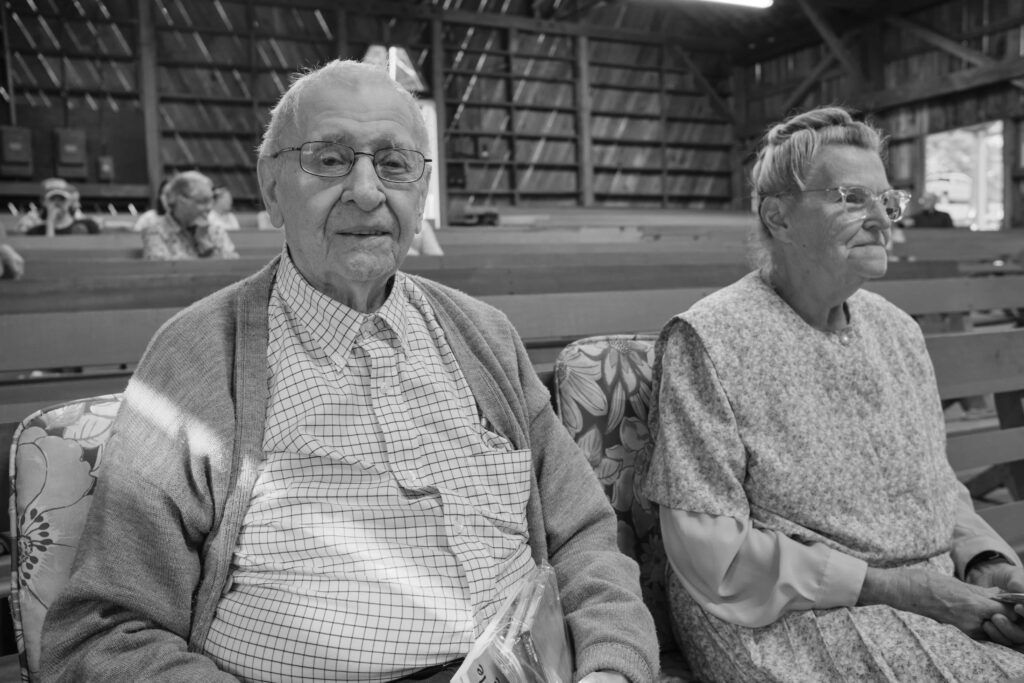
A native of Moatsville, Barbour County, Winfield was born June 9, 1930. He grew up next door to a Holiness congregation that lost its building to the impounded waters of the Tygart Valley Dam in the mid-1930s. “So, they built a church over there, outside of Grafton, and they called it Knoxville Church. It was just a mile from where I lived,” he said.
His mother was the backbone of the family. “Mom didn’t drink, or smoke, or nothing,” he said. “She went to church in her later years, after my daddy died. That was in Canton, Ohio. She went to church there, got saved.”
The family moved to Ohio in 1943 in search of employment opportunities. Winfield graduated from Timken Vocational High School in 1949 and found work as a mechanic in a Dodge dealership’s garage. He attended the Canton Second Church, Wesleyan Methodist, was saved there, and took some courses to prepare for the ministry. He and his wife, Mabel, moved back to West Virginia in 1955, in response to a call to serve the Olive Hill congregation. “They needed a pastor, so I just stepped in,” he said. He took a ministry correspondence course and worked as a mechanic during this time, as well.
When he responded to the call for a minister at Woolen Mill, the membership stood at around 12 or 13 souls, “but we ran (attendance) of 60, 70 sometimes,” he said. The church is part of the Allegheny Conference and did not participate in the merger that brought the Wesleyan Methodist and Pilgrim Holiness denominations together to form the Wesleyan Church.
Rev. Mayle saw many of the small West Virginia churches of the Allegheny Conference close their doors as their members “graduated to Glory.”
“We got paper churches,” he said while thumbing through the conference’s annual report. “They don’t have preachers.”
He lamented the modern trends within the holiness movement: relaxation of conduct standards, accommodation of Pentecostalism signs, and a falling away from the central tenant of “holiness unto the Lord.” That falling away was one of the reasons for establishing the tabernacle at Pleasant District, he said. Rev. Mayle felt it was a mistake not to connect the Preston County camp to an association of holiness camps, which would have given it greater exposure, attendance, and access to resources. The Allegheny Conference is affiliated with the holiness camp in Stoneboro, Pennsylvania. Then again, the conference is losing membership, as well.
The decline seems to be tracking the culture’s overall loss of interest in faith and morality, a trend that deeply concerned the soft-spoken pastor as he struggled with his own declines: failing eyesight that once allowed him to study God’s Word and muffled hearing makes the loud preaching unintelligible. He says the biggest difference between the way the camp was during his presidency and now is in attendance—the emphasis on holiness has not changed, however.

Campers say the week-long, intensive experience of prayer, three services a day, and fellowship over meals provides something the Sunday church service cannot. Larry Pierce says the familiarity and ritual of the Sunday service can lead to staleness. But, at camp, everything from the preaching to the relationships is on a deeper level. “So, we bear one another’s burdens, we share our joys and we share our sorrows,” Robert Gray adds. “There is a commonality here that most people don’t understand.”
For some, like Ardith Lewis, camp week is vacation, too. While she regularly worships in a holiness congregation, it was at camp she learned church etiquette as a young girl in the 1950s and ’60. She recalls the Pleasant District camp meetings from those days, when she and her 10 siblings came with her parents after her father got off work.
“We’d have to sit in the back of the church, it was that full,” Ardith says. The large numbers, estimated at well over 125, were driven by cooperation among the district’s churches. “It used to be, all the churches around would close their church down and come down here because (the camp) was non-denominational,” she says.

Robert says attendance has not recovered from the two years, 2020 and 2021, camp was not held due to Covid-19 restrictions. In the ensuing years, attendance has been “light,” Robert says. Then again, that trend seems to be tracking both the aging population, membership in holiness denominations, and an increasingly secular culture. The demands in way of dress, attendance, and holy living are largely unpopular in the culture, too. But Vernon says those standards can’t be relaxed because they are integral to receiving the blessings of camp.
It all comes back to the paradox of holiness. “If we don’t keep the standards, you don’t get the blessing. We have blessings in the service, and if we didn’t keep the standards up, and the world takes over, there’s no blessing. There’s no God,” Robert says.
The 2025 camp week is August 4-10. The camp is located on Route 26, six miles north of Bruceton Mills (exit 23, Interstate 68). For information, write to Pleasant District Holiness Association, 402 Narrows Road, Philippi, WV 26416.

CARL E. FEATHER
Feather, Carl E. ““Oh, glorious time!” “Oh, what preaching!”: Preston County’s Pleasant District Holiness Association.” Goldenseal West Virginia Traditional Life, Summer 2025. https://goldenseal.wvculture.org/oh-glorious-time-oh-what-preaching-preston-countys-pleasant-district-holiness-association/

